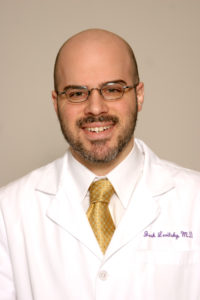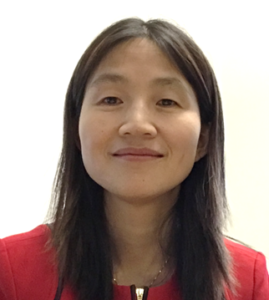Five Feinberg faculty members have been inducted into the American Society for Clinical Investigation (ASCI) and the Association of American Physicians (AAP), two of the oldest medical honor societies in the U.S.
This year’s ASCI inductees include Josh Levitsky, MD, ’08 MS, professor of Medicine in the Division of Gastroenterology and Hepatology, Huiping Liu, MD, PhD, associate professor of Pharmacology and of Medicine in the Division of Hematology and Oncology, and Daniela Ladner, MD, MPH, the John Benjamin Murphy Professor of Surgery and vice chair of research and innovation in the Department of Surgery.
This year’s AAP inductees are Stephanie Eisenbarth, MD, PhD, chief of Allergy and Immunology in the Department of Medicine and the Roy and Elaine Patterson Professor of Medicine, and Leonidas Platanias, MD, PhD, the Jesse, Sara, Andrew, Abigail, Benjamin and Elizabeth Lurie Professor of Oncology and director of the Robert H. Lurie Comprehensive Cancer Center of Northwestern University.
Investigating Immunosuppression in Organ Transplantation

“Being elected into the American Society of Clinical Investigation is a highlight of my career and an unbelievable honor. I hope to get involved in ASCI to benefit from being a member and support its robust tradition of advancing research and mentoring future generations of physician-scientists. In reaching this special milestone, I would like to thank everyone – my family, friends, colleagues, mentors – for supporting me through the years,” said Levitsky, who is also a professor of Medical Education and of Surgery in the Division of Organ Transplantation.
Levitsky’s research interests include liver transplant immunosuppression, transplant organ tolerance and biomarkers. In a recent study published in Science, Levitsky and collaborators discovered a family of proteins that could help predict which patients may reject a new organ transplant.
In collaboration with Neil Kelleher, PhD, professor of Medicine in the Division of Hematology and Oncology, the study details a non-invasive blood test created by the investigators which measures more than 20 protein variants associated with transplant rejection. The test could help physicians identify patients at risk of transplant rejection and administer additional treatments sooner, according to Levitsky.
“The promise here is to be able to use this panel to identify patients who have no signs of rejection versus those who have early evidence of rejection,” Levitsky said. “This may allow us to lower immunosuppression more safely in those without evidence of rejection, or increase immunosuppression in those who do – essentially personalizing the care of our liver transplant recipients.”
Levitsky was also recently selected as president-elect of the American Society of Transplantation (AST) and will begin his term as president in June 2023.
Uncovering the Molecular Mechanisms of Circulating Cancer Stem Cells in Metastasis

“I am honored and excited to join the American Society for Clinical Investigation. Joining the selective group of top scholars and physician-scientists is an inspiring milestone for me to continue my path for next higher level breakthroughs in biomedical research, clinical applications, and next-generation education,” said Liu, who is also a member of the Robert H. Lurie Comprehensive Cancer Center of Northwestern University.
Liu’s laboratory studies the underlying molecular mechanisms of disseminating cancer stem cells, subpopulations of cancer cells that not only self-renew and differentiate in different types of cancer cells, but also spread into blood and disseminate into distant organs to regenerate devastating secondary tumors.
Using a combination of machine learning and an array of experimental investigation techniques, Liu’s team discovered a novel interaction between the protein CD81 and CD44, a previously identified tumor-initiating cell marker, that promotes tumor cell cluster formation and lung metastasis of triple-negative breast cancer. Their findings, published in the journal eLife, reveal previously unknown mechanisms that drive breast cancer stemness and metastasis.
“The findings have broadened the knowledge of the molecular regulatory network of breast cancer cell stemness and may be significant for therapeutic targeting,” Liu said.
Liu’s research has also identified innovative therapeutic strategies for treating SARS-CoV-2, the virus that causes COVID-19. In a study published in Nature Communications, Liu — in collaboration with investigators at the University of Texas MD Anderson Cancer Center — discovered natural nano-bubbles containing the ACE2 protein (evACE2) in the blood of COVID-19 patients and that these nano-bubbles prevented infection from broad strains of SARS-CoV-2 in preclinical trials. The findings are the first to show evACE2 nano-bubbles exist in human blood and are a natural viral response to current and future strains of SARS-CoV-2.
“I am most grateful to Dr. Alfred George, chair of Department of Pharmacology, for his mentorship and initial nomination support to ASCI membership. I appreciate the creative, collaborative and nurturing environment in the Pharmacology Department, Lurie Cancer Center and the Division of Hematology and Oncology made by the Northwestern leaders, faculty, staff and trainees, especially the Liu Laboratory superheroes. I am also very proud that many faculty colleagues at Northwestern Feinberg School of Medicine such as Drs. Ardehali and McNally have been playing pivotal leadership roles at ASCI and JCI. I look forward to contributing to the continued growth of ASCI as well as the Northwestern community,” Liu said.
Studying the Epidemiology, Risk Prediction and Economics of Cirrhosis and Improving Transplantation

“I am honored and thrilled to be recognized for my scientific work by this highly accomplished group of clinician-scientists. I am particularly pleased about this recognition, because surgeons are less represented among NIH-sponsored investigators and within ASCI. I believe it is essential that surgeons are part of scientific communities and participate in scientific pursuit because they bring an important and unique perspective towards hypothesis-driven investigation,” said Ladner, who is also a professor of Medical Social Sciences.
Ladner’s research focuses on the epidemiology, risk prediction and economic impact of cirrhosis, or chronic liver damage that causes scarring and liver failure. She also studies process improvement in kidney and liver transplantation.
Ladner’s work has negated the misconception that women have lower cirrhosis-related mortality, with her findings published in the Journal of Hepatology, and has shown that Black patients have higher liver-related mortality yet are much less likely to receive a liver transplant, according to a recent study published in Hepatology. Ladner’s current research focuses on studying the progression, risk prediction and cost of cirrhosis, integrating proteomics and implementation science to improve clinical care.
Ladner is also the founding director of the Northwestern University Transplant Outcomes Research Collaborative (NUTORC), which brings together clinicians and disparate investigators across disciplines at Northwestern to do high-impact, innovative and data-driven end-organ and transplant outcomes science. She is also the Program Director of a postdoctoral and predoctoral training program with focus in increasing the pipeline of underrepresented minorities toward a clinician-scientist career.
“In order to improve care and outcomes for patients, it is important for clinician-scientists to pursue excellence across all scientific disciplines from basic to translational to clinical and outcomes science,” Ladner said. “I feel particularly privileged to be a faculty at Feinberg, which provides a highly fertile environment for surgeon-scientists and clinician-scientists and supports transdisciplinary work throughout the medical school and across schools within Northwestern University.”
Creating Innovative Approaches to Treat Diseases Caused by the Immune System

“I am really honored to be part of this incredible group of physician-scientists and excited to be part of the work that they are doing to maintain the pipeline for trainees and junior faculty embarking on this career path,” said Eisenbarth, who is also director of the Center for Human Immunobiology (CHI), a professor of Allergy and Immunology and of Pathology, and a member of the Lurie Cancer Center.
As director of CHI, Eisenbarth oversees trainees, clinicians and immunologists spanning 28 departments at Feinberg who are studying how the immune system fights new viruses, controls the growth of cancer, inappropriately responds to allergens, and targets the body’s own tissues.
The CHI, which was established in 2022, brings together interdisciplinary scientists and clinicians to uncover the molecular mechanisms of the immune system and translate new discoveries into innovative cures for immune-regulated diseases.
In her own laboratory, Eisenbarth’s team studies the role of dendritic cells, T-cells and B-cells in allergies, and explores a possible link between allergies and leaky gut. Her most recent work, published in Science Translational Medicine, found that the presence of food-specific IgA antibodies in the gut does not prevent peanut or egg allergies from developing in children.
“While we have learned a tremendous amount about the cells and molecules of the immune system in the past three decades, we are only recently learning how to apply this knowledge to treatments that effectively re-direct the immune response. By bringing together a community of researchers focused on immunology, we can help each other’s science grow,” said Eisenbarth.
Advancing Cancer Research and Targeting Cytokine Signaling Pathways in Malignant Cells

“Over the last decade, we have seen a remarkable scientific growth at Feinberg School of Medicine. The election to AAP is an honor for a physician-scientist and I am grateful to Dean Neilson for his support,” said Platanias, who also serves as associate vice president for Cancer Programs in Northwestern’s Office for Research and is a professor of Medicine in the Division of Hematology and Oncology and of Biochemistry and Molecular Genetics.
Prior to his appointment as director of the Lurie Cancer Center in 2014, Platanias served as the cancer center’s first deputy director from 2002 to 2013. Since he was appointed director in 2014, the cancer center has experienced dynamic growth in National Cancer Institute (NCI) funding, publications and the number of patients enrolled in early-phase clinical trials, as well as the recruitment of more than 140 new faculty members across Feinberg.
Platanias’ research focuses on cytokine signaling pathways in malignant cells and developing therapies that target those pathways. He received the Seymour and Vivian Milstein Award for Excellence in Interferon and Cytokine Research and has published more than 330 papers, with his work being continuously funded by the NCI for more than 25 years.
Platanias also serves as an associate editor and editorial board member for several scientific journals, serves on the NCI’s Subcommittee A for Cancer Centers, and has been a chair or member of many review panels, study sections, and site visit teams for the National Institutes of Health, Department of Veterans Affairs and the Department of Defense.
The ASCI, founded in 1908, is a medical honor society composed of more than 3,000 physician-scientists who are advancing research, clinical care, medical education and leadership in academic medicine and the life sciences industry. Levitsky, Liu and Ladner join more than 30 other Feinberg faculty as members of the society.
The AAP, established in 1885, is an honorific, elected society of America’s leading physician-scientists who exemplify the pinnacle of pioneering and enduring, impactful contributions to improve health. The AAP seeks to inspire the full breadth of physician-led research across all fields of science related to medicine and health, and to build a community of physician-scientists in support of the principle that objective science and evidence are essential foundations for improving patient care and the health of Americans.






